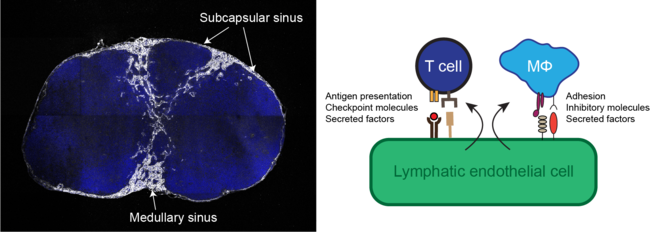Sie befinden sich hier
Inhalt
Deciphering immune-regulatory functions of lymphatic endothelial cells in lymph nodes
Lymphatic endothelial cells (LECs) are an important component of the lymph node stroma and are involved in the regulation of innate and adaptive immune processes in the lymph node microenvironment. For example, LECs provide a niche for sinusoidal macrophages, present self and foreign antigen, and express immune checkpoint molecules such as PD-L1 impairing T cell activation. Interestingly, single-cell transcriptional analysis has demonstrated that lymph node-resident LECs are heterogenous, comprising at least three subsets conserved in mice and human that populate the floor and ceiling of the subcapsular sinus as well as medullary sinuses. Recently, we found that these subsets dynamically and differentially respond to pathological conditions, for instance in lymph nodes draining chronically inflamed skin and primary melanoma. Using clinically relevant animal disease models we aim to comprehensively map the heterogeneity and phenotypic responses of lymph node-resident lymphatic endothelial cells in cancer, autoimmunity, and chronic inflammatory diseases, in order to identify immune-regulatory pathways that can be exploited therapeutically.
Kontextspalte
Contact

Prof. Dr. Lothar Dieterich
Heisenberg Professor of Anatomy and Developmental Biology with Focus on the Cardiovascular System
Anatomy and Developmental Biology (acting)
Phone +49 621 383-71482
lothar.dieterich@medma.uni-heidelberg.de

